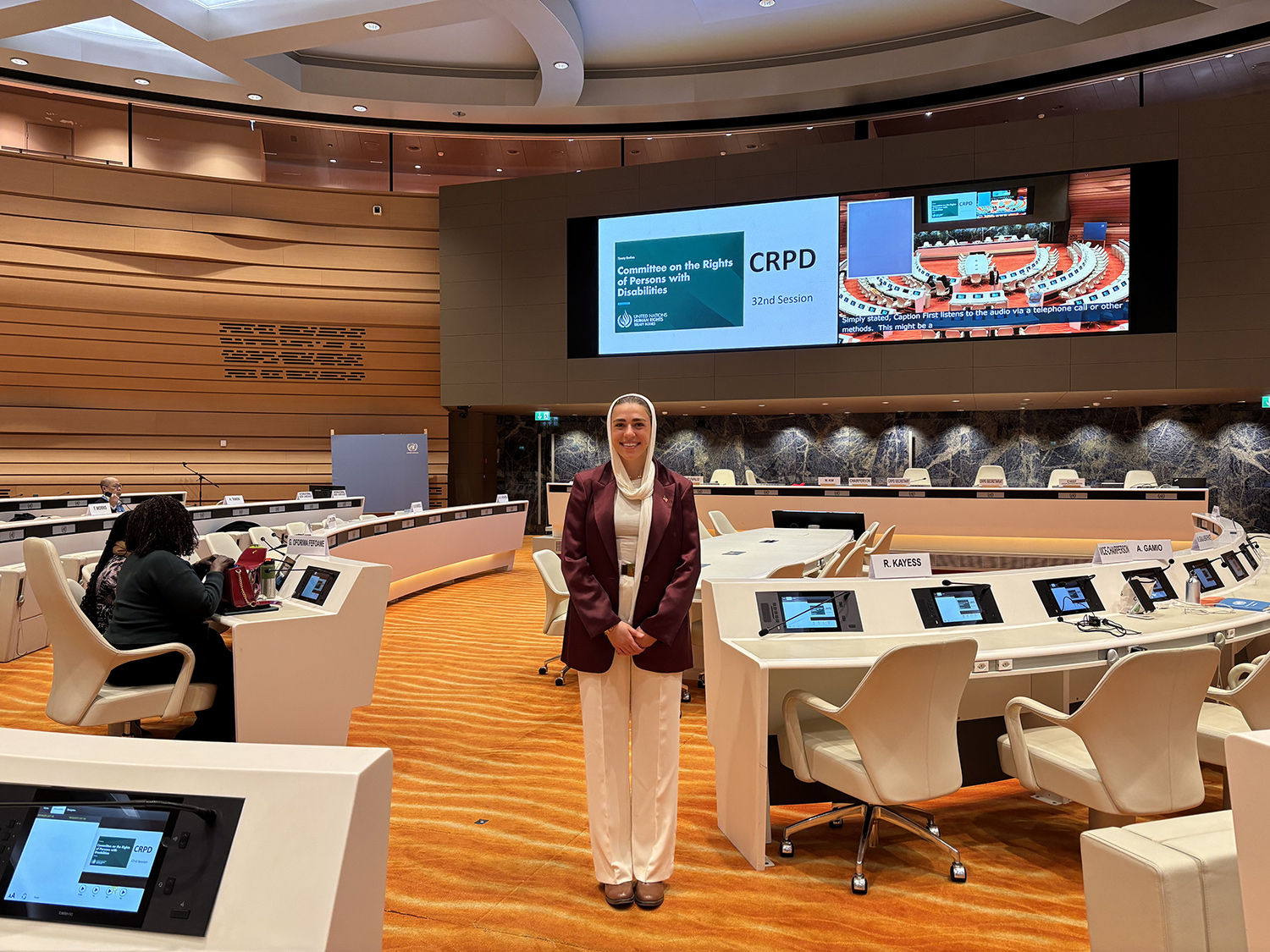
When it comes to leadership and achievement, 1L Layla Yousef has cast an impressively far-reaching net.
As an undergraduate at Johns Hopkins University, she monitored threats to U.S. national security by assessing power competition between non-state actors and institutions in Iraq, created a Cyber Attack Preventative Index based on South Asian states’ national security strategy, and was awarded numerous fellowships for her dedication to studying Russian foreign intervention in the Middle East and international law. She then continued her studies at Oxford University, where she received her geopolitics and diplomacy certification.
Yousef has served as a Yemen intern at the American Enterprise Institute, a research assistant at the Foreign Policy Research Institute, and a legislative intern in the office of U.S. Senate Majority Leader Chuck Schumer. This summer, she will return to Washington, D.C., and work as a law clerk in the Committee on Homeland Security and Governmental Affairs for the Senate Permanent Subcommittee on Investigations.
At UC Berkeley Law — still in her first year — Yousef is co-editor-in-chief of the Berkeley Journal of Middle Eastern and Islamic Law, vice president of the Student Association at Berkeley Law, and a fellow at the Miller Institute for Global Challenges and the Law and the American Society of International Law. Amidst her professional and academic commitments, she is a member of the Egyptian national women’s soccer team and is training for the 2027 FIFA Women’s World Cup.
Yousef, a dispute resolution paralegal in New York for two years before attending law school, has long been interested in international law and national security and gained unique experience working with the United Nations. She recently spent a week in Geneva at the UN Committee on the Rights of Persons with Disabilities (CRPD) — part of her new position as assistant to the chair of the UN CRPD Working Group on Communications and Inquiries.
Below, Yousef describes her Geneva experience, the research she did on Vietnam’s adherence to the Convention on the Rights of Persons with Disabilities, and how she entered a new realm of international law work.
A diplomat rushed down the escalator, quickly taking off his coat and leaving his suitcase in the vestiaire non gardé, the unattended “locker-room” area. As he ran to his conference room, I watched as others did the same, some going so far as leaving their coats with their passports and wallets sticking out from the pockets.
Initially perplexed and wary of leaving my belongings, the culture shock gradually subsided as the day went on. It became apparent that although I was still walking the halls of the United Nations like I had in years prior, my experience in Geneva was going to be much different than any other.

Something as simple as leaving belongings unattended spoke volumes about the difference in culture between the UN headquarters. Geneva’s work culture was more formal, technical, and humanitarian-focused, while New York — where I was previously located — was politically charged, fast-paced, and centered around security and conflict resolution.
While no one would dare leave their belongings unattended in the dynamic, bustling New York headquarters, I quickly found that Geneva, given its smaller scale, was built upon a system of honor, integrity, and trust. The host countries, the United States and Switzerland, play influential roles in shaping the broader geopolitical dynamic of the headquarters.
Geneva, renowned as the capital of peace and international diplomacy, is home to the UN’s most crucial specialized agencies and permanent missions. I soon found myself in Palais des Nations, a building originally created for the League of Nations and the current headquarters for the United Nations Office at Geneva.
During my time there, I had the privilege of working in the United Nations Committee on the Rights of Persons with Disabilities (CRPD), one of the nine treaty bodies responsible for reviewing State Parties’ adherence to core international human rights treaties.
For months before the UN CRPD’s 32nd Session, I drafted a bench memorandum on Vietnam’s adherence to the Convention, a human rights treaty that protects, promotes, and recognizes the rights of persons with disabilities. I analyzed submissions by the State Party, reviewed reports issued by national human rights institutes and civil society organizations, and conducted research on domestic legislation and issues affecting persons with disabilities in the State Party.
I was then sent to Geneva as the research assistant to Dr. Laverne Jacobs, an independent expert member from Canada and the brilliant and illustrious Rapporteur of the Committee. With the invaluable assistance and support of my mentor and UC Berkeley Law Professor David Oppenheimer, I had the fortunate opportunity to witness firsthand the Vietnamese delegation’s response to inquiries posed by the independent experts in the Committee.
While attending plenary and working group sessions, the latter became of particular interest to me as it involved a subset of the Committee members delving in deep detail into specific aspects of the Convention.
Notably, Dr. Jacobs became the chair of the Working Group on Communications and Inquiries while I was there, and after working closely together, she offered me the role of assistant to the chair. In my new capacity, I attend discussions on complex and confidential international human rights cases, contributing to the decision-making processes and maintaining the flow of communication within the working group.
My previous experiences within the UN involved combating threats to international peace and security caused by terrorist networks and delivering voluntary national reviews to state parties on their implementation of the Sustainable Development Goals. So, entering the realm of a treaty body which was unfamiliar to me has been a challenging but highly rewarding and transformative experience.
I am deeply appreciative of the opportunity to continue my work alongside Dr. Jacobs within the CRPD, and look forward to contributing further to the advancement of international human rights as we strive to create more inclusive and equitable global frameworks.